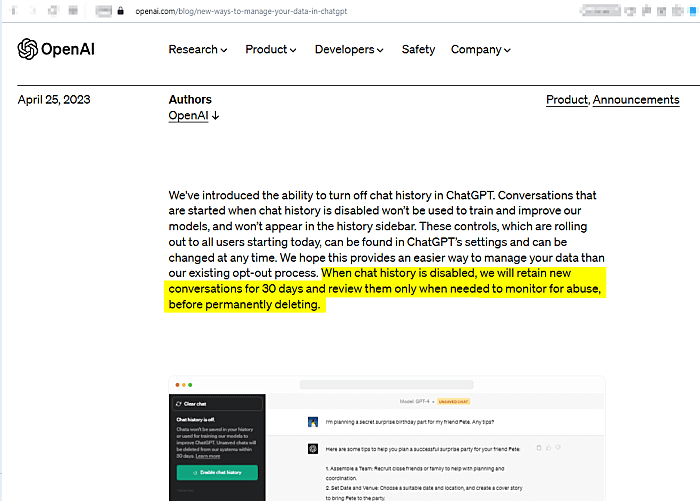
Date: July 19, 2023
The basic pillar of developing Artificial Intelligence in any field or industry is learning that directly stems from data. Now, while some AI apps platforms do exercise strict privacy policies, the AI itself can learn to capture sensitive data in its own approach. That, when done without the consent of the user it is collecting from, is a threat to their own privacy.
Remember the controversial thought where you start seeing ads of products minutes after you talk about them or any problem you’re facing? That’s not even AI. Now imagine how powerful AI can be in terms of capturing data without even having the need to ask us for our privacy consent?
Artificial Intelligence uses Large Language Models and Natural Language Processing to capture, analyze and educate itself on your behavior patterns, lifestyle preferences, diseases, dislikes and much more. But, it may be doing most of the data collection without even telling you about it. How?
AI models including ChatGPT from OpenAI, LLaMA from Meta, and PaLM2 from Google extensively rely on online data available on the most populated social platforms including Facebook, Reddit, Twitter, and Instagram.
The surprising part revealed recently by Twitter’s CEO, Elon Musk is that ChatGPT and its associated AI platforms have already been capturing Twitter’s user data illegally.
Apart from this, OpenAI powered AI platforms also capture multiple websites with weak or no privacy protection protocols, making data collection not only legal but unclaimable as well.
IoT is now getting powered by AI-enabled software, one of the best examples of which is your very own Alexa. The customization in behavior is quite evident if you simply check how two Alexa devices perform in two different houses. AI is mastering data generation through observation. What is it observing? Your conversations, arguments, sleeping patterns, active hours, and maybe even your health status, thanks to the smart wearables.
IP address, installed fonts, screen resolution, color depth, language preferences, web browser-installed add-ons, time zone, Operating System type and version, computing device hardware profile (CPU and GPU types, device memory).
Did you know that only 91% of users approve the Terms & Conditions section without reading them? With AI coming into our lives, the remaining majority of 9% will not be in safe hands either.
The reason why intent is a matter of concern is evidently presented in the below screenshot of ChatGPT’s privacy policy statement.

The statement says that it records your conversational data even after you disable it, keeps it for 30 days, and analyzes it in-between for monitoring abuse. What are they monitoring? What do they consider abuse of usage? This is a subjective statement that gives much more privacy invasion allowance to ChatGPT than you think is legally allowed.
Don’t use AI platforms, just like that. But if you do…
Artificial Intelligence is built to make our lives better, bring new innovations to life, and create an entirely new landscape of evolving technology for the greater good of humanity. But, part of this is our own alertness and intelligence while using these platforms. Till the time there are proper regulations on the development and usage of AI for general public use, kindly stay in safer hands by making better decisions.
OpenAI May Soon Launch Google’s Search Engine Rival
OpenAI plans to introduce its fully functional in-house search engine powered by ChatGPT and associated LLMs to compete with Google.

WhatsApp Is Refreshing The App’s UI After Ages
WhatsApp has been consistently adding new features to improve utility offerings. This time, it has refreshed the app’s visual experience.

Google Relaunches Wallet App To Safely Keep Everything Digital
Google has relaunched its latest wallet application in India as a one-stop storage solution for all important non-payment digital assets.

Google Threat Intelligence Will Use Gemini For Cybersecurity
Google Threat Intelligence is the latest introduction by Alphabet INC. and will function as the main cybersecurity layer for its service offerings.
